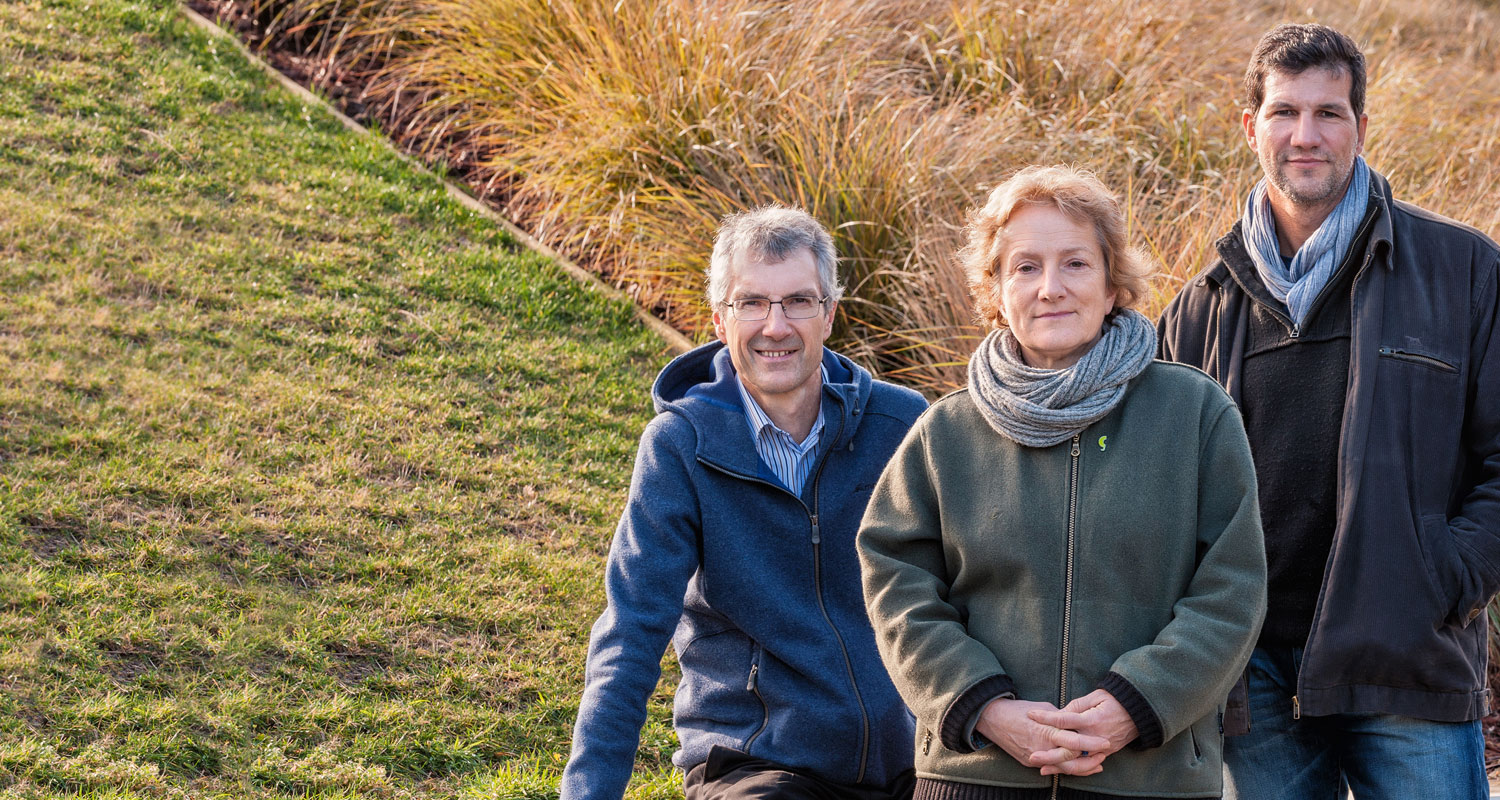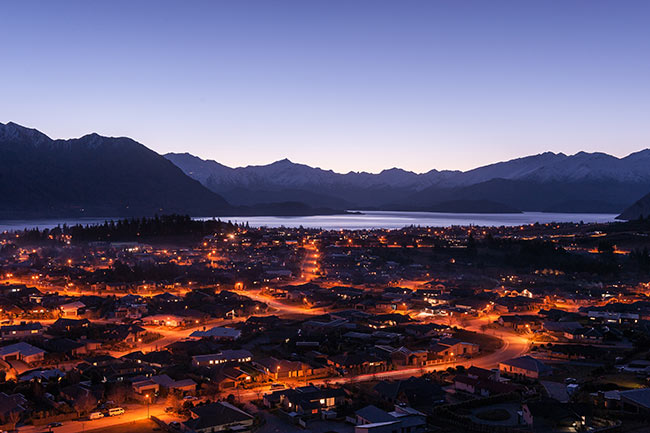
Changes and challenges
The new Catchments Otago research theme is taking a multidisciplinary and collaborative approach to helping overcome some of the most pressing problems caused by rapid changes in the Central Otago alpine lakes areas.
The Central Otago lakes' catchments at the foot of the Southern Alps are experiencing some of the fastest urban growth in the country.
The area surrounding Queenstown and Wanaka are a magnet for people drawn to the wild beauty of snow-capped mountains and pristine lakes. But could the influx of new residents, new infrastructure, new enterprises and ever-increasing numbers of tourists be damaging the very environment that attracts them?
New subdivisions are appearing at a rapid rate, with consequent demands on infrastructure such as increased stormwater flow from hard surfaces and septic tank use, prompting public health concerns, as well as issues such as potential nutrient enrichment and sedimentation in the lakes.
Intensified agriculture, associated run-off into rivers and lakes, increased demands for irrigation water and land-tenure change all contribute to pressures on the environment.
These are pressing problems and wide-ranging concerned communities are seeking answers.
A new multidisciplinary research group at the University of Otago now plans to help with such issues.
The Integrated Catchment Management Research Theme – or Catchments Otago for short – will be working with external organisations, groups and individuals to help develop land and water management strategies to address some of the challenges the region currently faces, as well as those that may arise in the future.
The aim is to find ways of sharing natural resources with sustainable and equitable economic, environmental and social outcomes.
Research co-directors Professor Kath Dickinson (Botany), Professor Philip Seddon and Associate Professor Gerry Closs (Zoology) lead a diverse team of experts from across all four of the University's academic divisions (Commerce, Humanities, Health Sciences and Sciences).
They aim to identify problems and seek solutions in collaboration with interested external communities. Community involvement is a key part of the research theme's aims, says Dickinson.
“We've all worked together on ecological programmes in the past and are used to going into communities to find out their needs. None of us subscribes to the idea of the University being an ivory tower and out of touch with the real world. All three of us feel applying our science is important and all of us work with communities to do so.
“Catchments Otago will be meeting with organisations and individuals to find out how we can best work with them to address pressing management issues. We are there to listen, not to tell.”
The origins of this Research Theme go back to the 1990s, when Otago's Ecology Research Group in conjunction with the Environmental Policy and Management Research Centre brought together people involved in a wide range of research within the University.
“A lot of research publications, symposia, research student co-supervision and teaching initiatives came out of the connections made within the membership,” says Dickinson.
“We have built on those experiences and connections and have now been successful in launching the Catchments Otago idea, thanks to support from the University's Deputy Vice-Chancellor Research, Professor Richard Blaikie.”
The University has allocated research theme funding to Catchments Otago for five years. This seed funding is aimed at facilitating increased connectivity between the theme's members and external communities, and encouraging research that will cover topics falling roughly under the sub-headings of water, biodiversity and people.
Catchments Otago will improve multidisciplinary research collaborations, says Dickinson.
“We did a lot of groundwork around the University in putting our theme application together and found about 60 individual projects were already going on in the Central Lakes area. The vast majority of these projects complemented each other in one way or another, so we knew we needed to get the researchers involved together.
“When people work on their own they don't always see other opportunities. But those soon arise when you get individuals together for group discussions. That's what we aim to do.
“As directors, we have an overview and can see synergies between different researchers. We aim to create opportunities for them to meet and potentially work together, which then may lead on to opportunities for our research students.
“We are keen to up the connectivity of the University, both internally on campus and externally with communities.”
Dickinson is quick to point out that the directors of Catchments Otago share the responsibility of keeping the research theme on track. “We are facilitators. We all have our own work to handle as well, so we all do what we can when we can. It's very much a team effort.”
Enterprise manager for Environment, Energy and Primary Industries Dr Mara Wolkenhauer and Catchments Otago research fellow Dr Cynthia Winkworth-Lawrence round out the core team.

This first year is focusing on team building within the University and forging links with external communities locally and in the target region around the central alpine lakes. Approaches are being made to community organisations and collaborative relationships with the Otago Regional Council and the Queenstown Lakes District Council are being developed.
“When we meet people in the communities we want to find out what research they need and see how we might be of assistance. We want to respond to what they tell us.
“As one of New Zealand's fastest growing urban areas, the Central Otago alpine lake catchments of Hawea, Wakatipu, Wanaka and Hayes face complex developmental challenges across environmental, social and economic disciplines.
“Things are happening really fast in the region. There's a lot going on and people know it. It's all happening at the same time and quite overwhelming.
“We can see there are problems. But we need the communities to help us identify how we can best use our research group's expertise.”
Work has begun to identify areas where community input would be valuable to promote research and where research may assist decision-making.
“None of us can do this on our own,” says Dickinson. “But we can collaborate in many areas and, in some cases, we can put together joint grant applications with other organisations to help fund our work.
“We are looking at applying to the Ministry of Business, Innovation and Employment and other opportunities for funding from the government. We want to bring more research funding into the region in partnership with others, where we can work together for better outcomes all round.”
A series of workshops will be held in November to get local knowledge in the study areas of Lakes Wakatipu, Hayes, Wanaka and Hawea.
“All the lakes are very different and manage things differently. The communities' interests are very different, so there are no one-size-fits-all answers at this stage.”
Catchments Otago will also be looking at educational opportunities in the area, such as running short courses, or even setting up a physical presence in the region, leading to both learning and teaching opportunities.
For now, the group needs to prioritise research initiatives.
“Areas of Otago and Southland are transforming very quickly, for example in the use of water for agriculture and housing. The speed of change is quite mind-boggling.
“We need to identify the most pressing issues and then fast track them. Communities need advice as to what to do now. We can't wait 10 to 20 years. Medium to long-term research work will need to be planned and applied for — we have to remember that all research is dependent on funding.
“There are some very difficult issues out there to address. But if we all work together and explore theoretical and practical perspectives we have a good chance of dealing with some of those issues.
“I'm very positive about where we are heading with introducing the University of Otago's expertise. From the mountains to the sea, we're encouraging people to talk holistically and not compartmentalise.
“It's important to see the connections between water, plants, people and the environment around them. It's all neatly summed up in the often expressed desire: I want my grandkids to be able to swim in the rivers and lakes.”
Catchments Otago seeks to:
- understand community needs
- inventory key resources
- undertake projects to ensure efficient, equitable and sustainable resource use
- undertake high quality research that will underpin management decisions
- deliver tools for improved freshwater management for target communities
- co-ordinate and enhance the University of Otago's capacity in the Central Otago Lakes region.